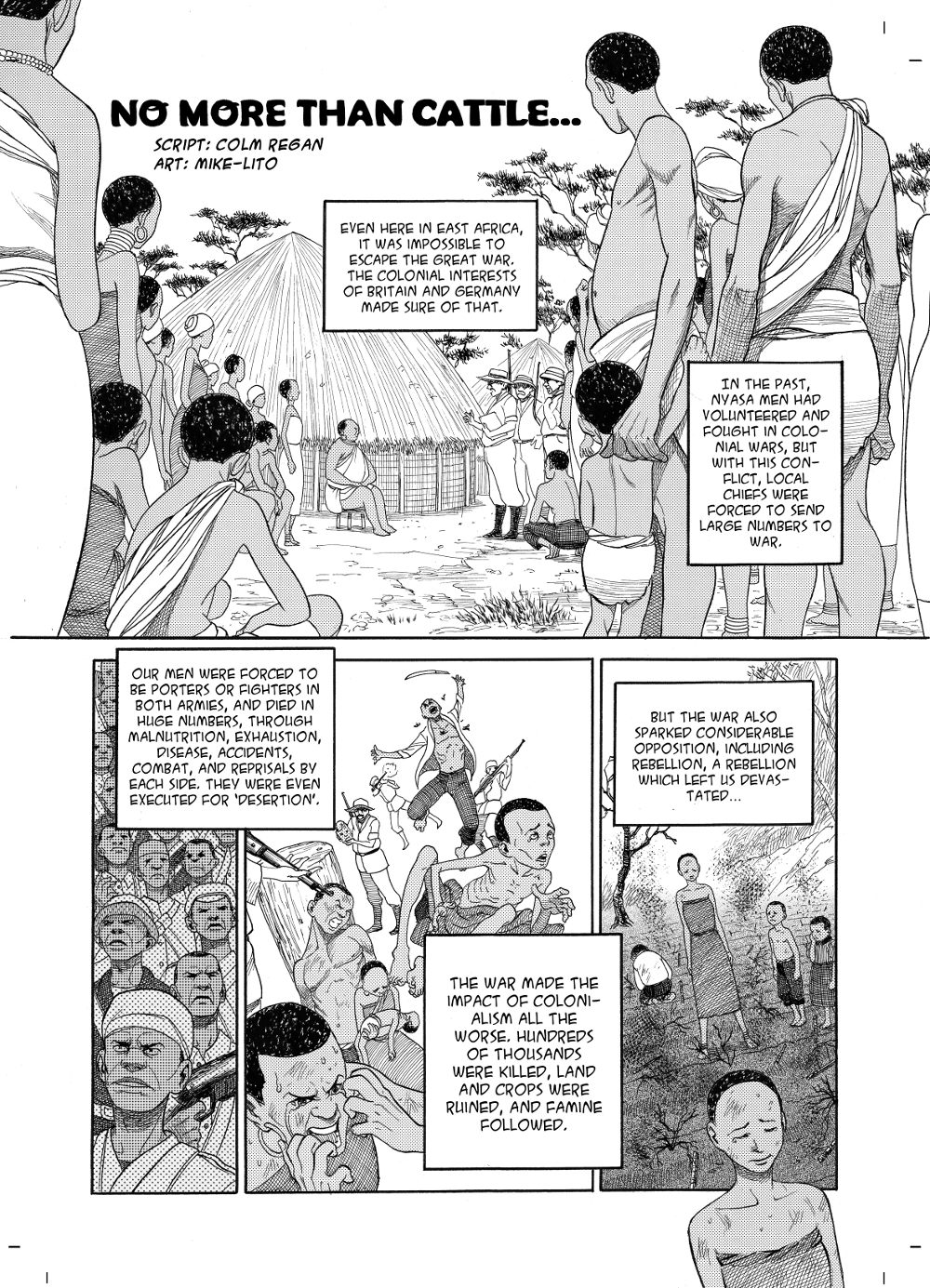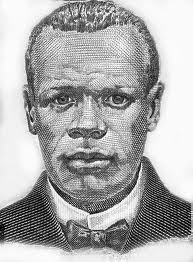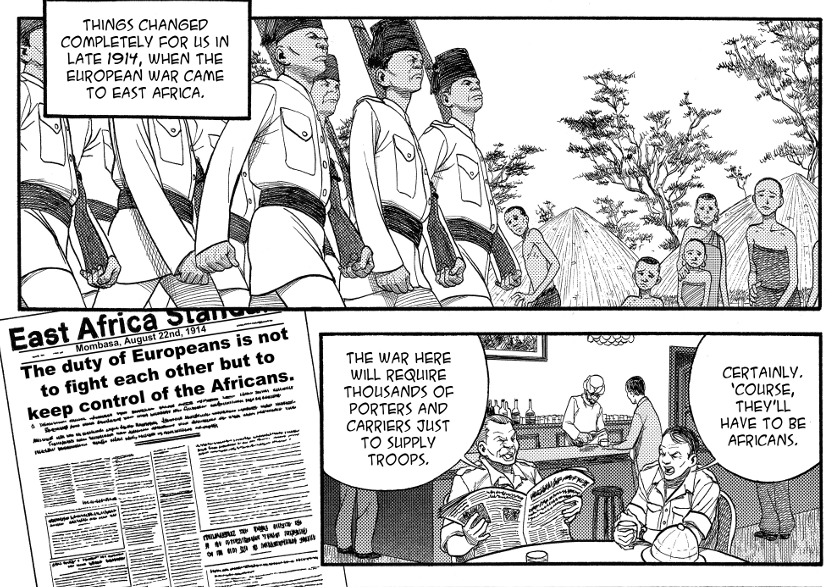
Developmenteducation.ie cartoonist Brick (aka John Clark) has teamed up with co-editor Jonathan Clode and 51 other contributors and graphic artists (including this author) to deliver a graphic anthology of 27 short stories on the First World War – To End All Wars to be published July 2014 by Soaring Penguin.
In introducing the project, John argues:
‘The so-called ‘Great War’ was the first truly multinational war, the first heavily mechanised war, the first oil war, the first fought to the benefit of capitalists on both sides, the first to murder millions of civilians and the last orchestrated by kings, barons and lords as if it were a ripping game of polo. It was the first to wipe out whole streets of young men and destroy the lives of millions of mothers and lovers, two generations of women who grew old as widows and spinsters, enfranchised and empowered to become career professionals. The changes needed to welcome in the 20th Century were always going to involve a vicious bloody struggle far greater than the French and American Revolutions combined.
This anthology doesn’t pretend to tackle these issues, but it does aspire to free WWI from the censorship imposed by London and Berlin before the first man fell, blinkers that still cramp our reading of this holocaust. Offered up by creators working in a medium that was barely a foetus in 1914, it is our humble tribute to the ten million combatants sacrificed… for what?’
The story of the project and its aims is described by John and Jonathan on https://toendallwarscomic.wordpress.com/about
One of our key objectives in working on TEAW was to graphically illustrate the human realities of the war and to uncover and highlight some of its less well-known dimensions. For example, Artist Mike Lito and myself worked on one of the 27 ‘stories’ in the anthology – ‘No more than cattle’ which recounts aspects of the War on the colonies in East Africa.
We explored the tragic history of one of Africa’s  least likely early rebels Pastor John Chilembwe perhaps known to some of our readers as his image is featured on Malawian currency notes.
least likely early rebels Pastor John Chilembwe perhaps known to some of our readers as his image is featured on Malawian currency notes.
Another example of our approach in the anthology is the story of Welsh poet Hedd Wyn described by John’s co-editor Jonathan Clode here – https://toendallwarscomic.wordpress.com/articles/ In his commentary, Johnathan touches directly on one of the current debates about WW1:
‘All across the Ypres Salient, it struck me that there were two distinct types of remembrance – the stoic, nationalistic pride in a necessary sacrifice (see David Cameron & Co.) versus the grief that comes from the futility of it all. If the people who visit Ypres see the same things I did, then I fail to understand how they can take pride in the decisions of any nation that chooses to condemn its son’s to such a fate.’
As with all wars, WW1 remains the subject of intense debate and disagreement, especially so as we approach its anniversary and the inevitable headline ‘grabs’ by politicians rushing to ‘claim’ the war for their own ideology.
Earlier this year, English Education Secretary Michael Gove caused the inevitable stir (inevitably in the Daily Mail) when he accused ‘left-wing academics’ (not to be confused with ‘right wing’ academics) of perpetuating the ‘Blackadder myth’ that the First World War was merely a ‘misbegotten shambles’; David Cameron backed Gove, saying the war was fought ‘in a just cause’. Blackadder actor Sir Tony Robinson’s response to Gove is well worth reading (BBC News, 05 January 2014).
To End All Wars is, in part our response to this kind of debate and to those who would wish to ‘glorify’ the war (and all wars for that matter including those on this island) – this dimension has been commented on in a recent review of TEAW in The Independent by Adam Sherwin (Acclaimed comics artists publish powerful anthology of stories to combat Michael Gove’s ‘jingoistic’ interpretation of WW1, 01 April 2014).

WW1 has also inevitably been highly controversial in Ireland and was, for many years air-brushed from official Irish history; at last this too has changed. The BBC has produced a useful site on the War https://www.1914.org/about/ and another on Ireland and the War https://www.bbc.co.uk/history/british/britain_wwone/ireland_wwone_01.shtml but perhaps a good place to start is the joint Goldsmith’s College, London and Exeter University site https://irelandww1.org/About-Us.html (which has a useful and accessible 6 page resource for using in schools).
The many graphic and horrifying stories of the Irish and WW1 are not told in this anthology but perhaps we may yet convince our co-editors to include it in the next volume!
______________________________________________________________
- Explore Brick’s cartoon of the month series on DevelopmentEducation.ie
- Visit the To End All Wars project blog at https://toendallwarscomic.wordpress.com
- Tweets @toendallwars, @JohnBrickClark
